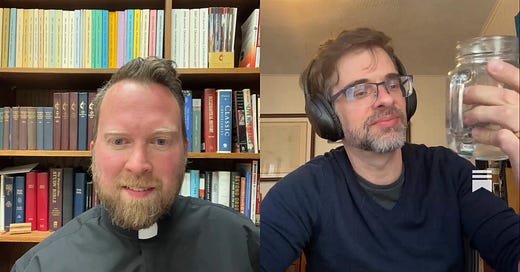Jeffrey Rickman and I recorded a Live conversation yesterday about my February post on the return of hierarchy as a source of meaning. Jeffrey and I were seminarians and friends at the Boston University School of Theology together, entering grad school right as the Great Recession hit. He got his M.Div. and skedaddled, while I stuck around BU for a PhD in religion. These days, Jeffrey is a Methodist pastor and runs a successful Substack, and I’m a Catholic social scientist.
The Return of Kings
It’s the mid-2020s, and big changes are upon us. The postwar international order led by the United States is pretty much dead, even as America-first patriotism (and jingoism) are making big comebacks. The borderless, horizontal world of neoliberalism is crumbling, while the Trump administration is targeting cultural liberalism with every tool at its dis…
Jeffrey is probably a bit more of a democrat that I am. Or at least, as you’ll see in the conversation, he’s more optimistic about the promise of new technologies (including Substack) to upturn unjust hierarchies. I take Jeffrey to be saying that, by toppling the monopoly of legacy media and other parts of the ideological apparatus over the flow of information, tools like Substack can unmask incompetent authorities, revealing that the emperor has no clothes. Then, only truly legitimate (i.e., knowledgable and competent) authorities will be left standing. Or at least have a better shot at holding power.
I wasn’t quick enough on the draw to make this point in our conversation, but I think that Jeffrey’s expectation gives voice to a particularly modern aspiration that I understand, but which I don’t quite trust. Let’s take a cue from Ian Hacking and call this aspiration unmasking — the assumption that revealing the rotten truth about social constructs and authorities will always produce more enlightened and pleasant outcomes.
Unmasking is one of the great themes of modernity. It crops up with the Reformation and gains steam through the French and other great European revolutions, reaching a terrible crescendo in postwar critical theory. The base ingredient for critical theory’s uniquely pungent stew is the assumption that nearly every operation of society is based on lies whose purpose is to disempower and bamboozle the weak (or everyone). False consciousness is the name of the game. Unmasking these lies is therefore the act of noble liberators. Whenever we can find “the mask slipping” — a powerful person’s act momentarily falling apart, revealing an ugly truth underneath — we know that ugly truth is the reality. By shining the light on it, exposing it, we can weaken the web of lies that binds us all.
In other words, unmasking exploits the incompatibilities between what powerful people say and what they do — that is, hypocrisy and incompetence — to pursue a sweeping reformist agenda. In the modern world, this agenda sometimes verges into something like gnosticism: a kind of totalizing drive to rid the world of social evil, leaving only the pure and unstained to dwell in utopian peace.
Obviously, hypocrisy and incompetence are bad. And I’m not accusing Jeffrey of being a utopian (or a gnostic). Nor am I sad to see Substack and other alternative media outlets “unmasking” just how bankrupt much of our leadership class is.
But would anybody stand up against the standard of perfect alignment between words, image, and deed? Is it always good to magnify the warts of our leaders, to expose their foibles?
I’m not sure it is.
Sometimes you need your leaders to play a role that serves a unifying, not an administrative, function. And when leaders play such roles, you need a willing suspension of disbelief — just as when going to the theater.
The king enters a hall in Durkheimian splendor, striking a note of pride in the hearts of all the assembled nobles. The kingdom now seems like a nation to love, not spoils to fight over.
A CEO releases a unifying message after a rough quarter, encouraging a worried workforce and soothing spooked investors.
A college basketball team captain gives a rousing speech to her teammates in a huddle right before the crucial third quarter, rallying them to a hard-fought victory.
Would it be helpful at those moments to know that the king is a vicious lout, that the CEO struggles with a nasty porn habit, that the team captain once cheated on a calc test?
No, I’d argue that it wouldn’t be.
It would destroy the theatrical reality that, in those moments, is the reality that matters.
Sure, it would be better if the king were a decent man, the CEO weren’t hooked on OnlyFans, and the team captain were honest in math class. But the balance between unmasking the illusion and allowing it to do its important work isn’t obvious or easy. Every leader is a flawed human being, carries secrets that might delegitimize his or her role. Yet we still need leaders.
Ultimately, what I’m interested in is particularly this theatrical aspect of leadership and hierarchy. I fundamentally suspect that, if you insisted on and got only the raw, unfiltered truth — if you successfully cut down below all the social constructs and illusions — you’d hit nothing but the cold, hard bedrock of heartless biological drives and the devouring will to power.
This might be my Catholicism speaking. It’s a messy version of the Christian faith, but we Catholics do understand the theatrical. A really good Catholic liturgy is, like a theater kid’s dream come true. (Ask me how I know.)
We humans are the homo ludens, the playful animal. We create illusions through ritual and play and then live in those illusions — successfully, in many cases. If taken to its logical conclusion, unmasking undermines this most fundamental of human gifts.
But that’s only an aside in this larger and, I thought, fun and interesting conversation Jeffrey and I had, and which I really enjoyed. Hopefully we’ll have more of these as we explore these ideas from our different perspectives. Thanks to him for inviting me. Check out his Substack below.












Share this post